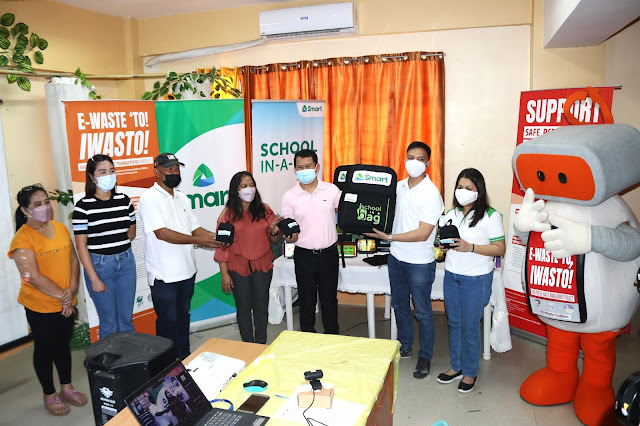PLDT, SMART, DENR and UNIDO e-waste program to equip QC schools with digital tools
Teachers and students from San Agustin Elementary School and Nova Homes Day Care Centers in Barangay San Agustin in Quezon City are the latest recipients of digital learning tools from PLDT and Smart, as incentive for their community’s effective e-waste management efforts.
Two School-In-A-Bag (SIAB) packages and 50 #LearnSmart Kits were turned over by PLDT and Smart, in support of the “E-Waste to E-Learn” initiative of the United Nations Industrial Development Organization (UNIDO) and the Department of Environment and Natural Resources (DENR), in cooperation with the Eco Waste Coalition and under the Global Environment Facility (GEF) funded, “Safe PCB & Ewaste Management Project”, which aims to eliminate POPs such as Polychlorinated biphenyls (PCBs) and Polybromindated Diphenyl Ether (PBDEs), the latter mostly found in e-wastes. Apart from this, the project aims to educate communities on safe management of these POPs.
All e-wastes surrendered by community members from July to September 2021 earned equivalent points. Cumulative scoring for the e-wastes collected in the barangay determined the incentives awarded to the beneficiary schools. Outstanding participants were then rewarded with SIABs and digital tools to help schools in their area address some of the challenges of distance learning during the pandemic lockdowns.
“We are extremely pleased that through this initiative, we are able to not only demonstrate sound approaches toward health, environment protection and a greener and more circular economy, but also contribute to promoting education amidst the ongoing containment measures. While the UNIDO is one with the United Nations Country Team in advocating for the systematic return to face-to-face classes, we likewise realize the need for enabling students to participate in online blended modules through access to reliable mobile internet connections and digital tools, recognizing as well the growing concerns around the digital divide that were aggravated by the pandemic”, said Mr. Teddy Monroy, UNIDO Country Representative.
Each Smart School-in-a-Bag includes a water-resistant backpack that contains a laptop for the teacher, 10 tablets that allow students to access interactive applications even while offline. The SIAB also includes a Smart LTE pocket WiFi kit which teachers can use to connect to the internet and download additional content. Educational content pre-installed in the donated devices include Smart’s proprietary #LearnSmart Mother Tongue -Based Literacy Apps. The GSM Association (GSMA), the industry organization that represents the interests of mobile network operators worldwide, cited these award-winning mobile applications which feature alphabet and number exercises, short stories, and games in native languages and dialects.
Complementing the SIAB is a #LearnSmart Kit, an online learning companion packaged in a mini-pouch that carries a Smart LTE Pocket Wifi unit and a 32GB USB. The latter is pre-loaded with Smart's learning content, such as Learning Activity Sheets of the Central Visayan Institute Foundation-Dynamic Learning Program (CVIF-DLP). Supported by PLDT and Smart for over a decade, the innovative teaching methodology was one of only three supplemental learning resources endorsed by the Department of Education (DepEd) starting SY 2020-2021.
The USBs provided also contained “Maging Laging Handa” disaster preparedness videos reviewed and approved by PAGASA (Philippine Atmospheric Geophysical and Astronomical Services Administration), PhilVocs (Philippine Institute of Volcanology and Seismology), and the Mines and Geosciences Bureau of the Department of Environment and Natural Resources. Other contents include Smart's eStorytelling videos and SEAMEO INNOTECH’s Digital Citizenship e-Book and Learning Packets.
“With the goal of democratizing access to technology for distance learning, the LearnSmart Kits and School-in-a-Bag packages provide access to technology, connectivity, content and pedagogy during this pandemic. This is aligned with our goal that there will be #NoLearnerLeftBehind amid education’s new normal,” Smart Community Relations AVP Stephanie V. Orlino said.
“We are grateful for the UNIDO-EMB Safe PCB & Ewaste Management Project project for including Brgy. San Agustin as a participating community which gave us an opportunity to initiate proper e-waste collection and disposal in our barangay while also giving us an opportunity to donate learning kits to our chosen beneficiary”, says Mr. Ramiro Osorio, Chairman of Brgy. San Agustin.
“These LearnSmart and School-in-Bag packages will be a big help for our students to access quality education and for our teachers to effectively conduct distant and online learning despite the challenges posed during this pandemic” Mr. Randy Tagaan , Principal, San Agustin Elem School shares.
To build holistic awareness of e-waste management, the initiative also arranged for community lectures. Topics include the environmental consequences of the persistent organic pollutants (POPs) and Polybrominated diphenyl ethers (PBDEs) present in E-waste.
“Let us endeavor to keep our country free from POPs such as PBDEs from e-waste, as this is our commitment to the Stockholm Convention. To our project partners, Barangay San Agustin, the Homeowners Association, and the San Agustin Elementary School, thank you for your contribution to the sustainable e-waste management in the country!” DENR-EMB Environmental Quality Management Division Chief, Engr. Marcelino Rivera remarked.
“This grassroots program is part of the PLDT Group’s greater focus on supporting the Social pillar of our sustainability initiatives. It addresses two key areas, namely, e-waste management and the use of technology in education to bridge the digital divide. We look forward to more opportunities to replicate this program in partnership with UNIDO and the DENR,” said Melissa Vergel de Dios, Head of PLDT’s Sustainability Office.
Engaging different shareholders in this initiative provides a starting point for an institutionalized partnership among the e-waste generators and telecommunication companies and TSD facilities for the proper e-waste management and advancing a circular economy agenda.







Comments